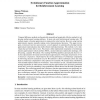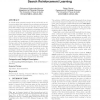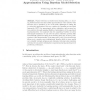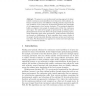47 search results - page 7 / 10 » Reinforcement learning with function approximation for coope... |
CORR
2010
Springer
13 years 7 months ago
2010
Springer
Temporal difference methods are theoretically grounded and empirically effective methods for addressing reinforcement learning problems. In most real-world reinforcement learning ...
ATAL
2009
Springer
14 years 1 months ago
2009
Springer
In several agent-oriented scenarios in the real world, an autonomous agent that is situated in an unknown environment must learn through a process of trial and error to take actio...
PKDD
2009
Springer
14 years 1 months ago
2009
Springer
Abstract. Feature selection in reinforcement learning (RL), i.e. choosing basis functions such that useful approximations of the unkown value function can be obtained, is one of th...
ECML
2007
Springer
13 years 11 months ago
2007
Springer
Abstract. We present a new reinforcement learning approach for deterministic continuous control problems in environments with unknown, arbitrary reward functions. The difficulty of...
CORR
2012
Springer
12 years 2 months ago
2012
Springer
Bayesian priors offer a compact yet general means of incorporating domain knowledge into many learning tasks. The correctness of the Bayesian analysis and inference, however, lar...




